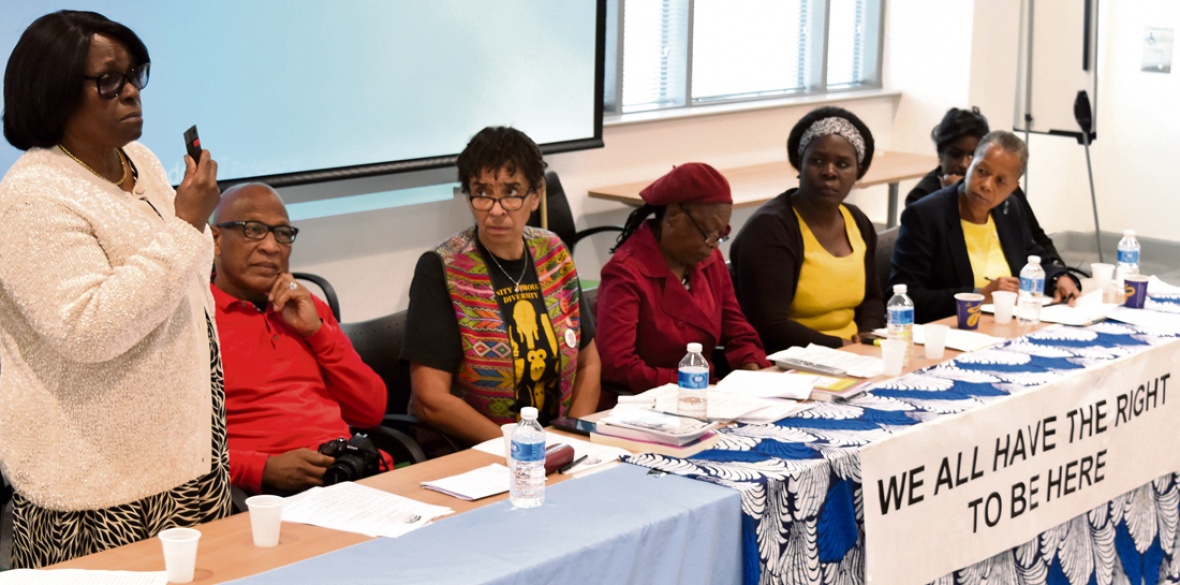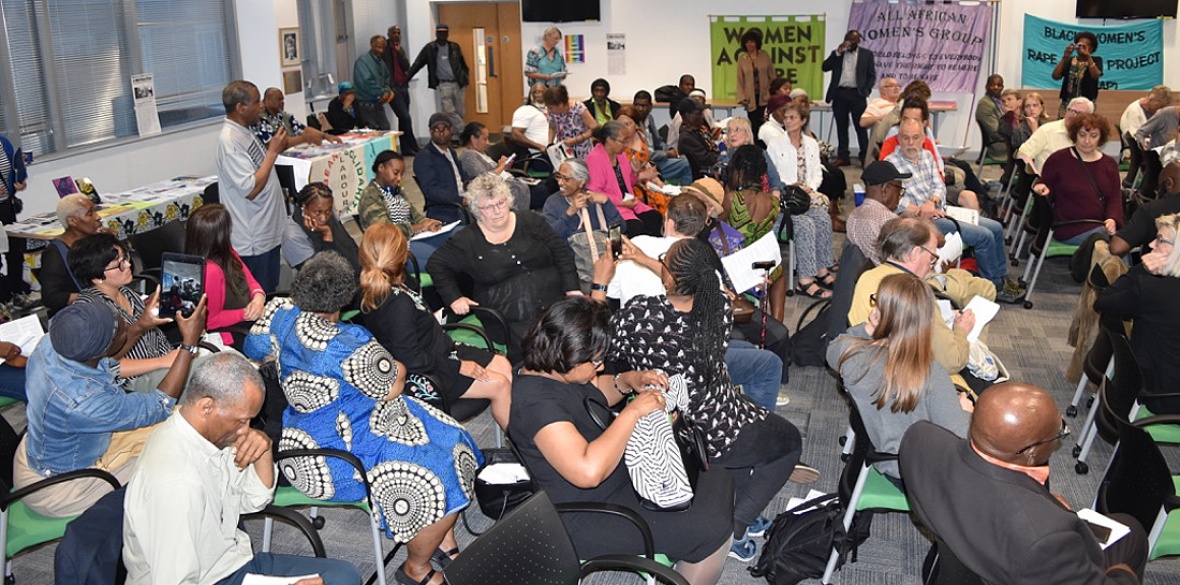This is the last article you can read this month
You can read more article this month
You can read more articles this month
Sorry your limit is up for this month
Reset on:
Please help support the Morning Star by subscribing here
On May 31 150 people came together for We All Have the Right to Be Here, a meeting to confront the “hostile environment.”
Caribbean people had been invited to rebuild war-torn Britain, the first wave arriving on the Windrush Empire in 1948.
As “subjects of the Queen” they were British citizens. They worked hard often for the lowest wages, but now they and their descendants were discarded and told to leave.
The meeting attracted Commonwealth families, asylum-seekers, EU nationals, anti-deportation campaigners, Labour Party members (including local councillors), trade unionists and lawyers — a great mix.
The Windrush scandal has exposed the true horror of deportation.
This has shocked the public and now people are asking should anyone be persecuted in this way?
The demonisation of immigrants is beginning to lose its sting.
George Dodo-Williams, Unite’s regional officer, welcomed everyone. Cristel Amiss (Women of Colour Global Women’s Strike) co-chaired with Luke Daniels (Caribbean Labour Solidarity), the organisations calling the meeting.
Daniels connected the treatment of the Windrush generation with 300 years of slavery and the campaign for reparations for that criminal and murderous exploitation.
Amiss pointed out that: “Our reasons for being here are many and varied — fleeing dictatorships, proxy wars, rape, environmental catastrophe. Plenty has been stolen from all of us — natural resources and people. We all have the right to be here.”
Sentina Bristol, known from media interviews, was warmly welcomed. She had come here aged 18, trained as a nurse and worked 40 years in the NHS: “I worked hard, faced a lot of racism, insults and abuse.
Britain benefited from our blood, sweat and tears. Now they have to give us our rights, alongside the rights of every immigrant who wants to stay. Britain owes us. We don’t owe Britain
“My son died five weeks ago: his job was taken away, he was denied benefits and told he had no right to stay. He’d been here from age eight and knew no other country. His family are here... this Conservative government is wicked, unjust. I am angry and hurt. They need to take responsibility for my son’s death, and all the other suffering.”
Annette Hall, whose father arrived in 1961, came in 2002 to be his carer but was refused and had to claim asylum.
After years of struggle “the court granted me the right to remain but only for two-and-a-half years.
“Yet I’m entitled to be here through my father’s citizenship. Britain benefited from our blood, sweat and tears. Now they have to give us our rights, alongside the rights of every immigrant who wants to stay. Britain owes us. We don’t owe Britain.”
“Asylumseekers have suffered similarly with Windrush people,” said Ruby Alok of the All African Women’s Group.
“The hostile environment teaches people to be racist and brutal and forces us into exploitation to avoid destitution. Employers know we can’t complain... One in 10 women in our group is midwife but we are refused the right to work while nurses and midwives are being recruited from the Caribbean and elsewhere. They use us when they need us, and then throw us out.”
She outlined the collective self-help of AAWG and the anti-deportation groups at the Crossroads Women’s Centre — how they train themselves to understand their case and make lawyers and the Home Office understand it too.
She held up the asylum guide which has been used, especially by women in detention, to fight deportation.
Solicitor Jacqui McKenzie made clear that people had been persecuted for years, but more so since Theresa May’s “hostile environment” came into play.
“From 2014, anyone renting accommodation or applying for a job could be thrown out.” The law instructed employers, landlords, schools and the NHS — even GPs — to refuse services to anyone who could not prove citizenship, creating an army of border guards in the community. Many refused.
“It’s not just Windrush,” McKenzie continued, “it’s about a system that denigrates people, and splits up families. The children of asylum-seekers who have had one scrape with the law are sent back to countries where they never lived.”
Mirroring the 2014 law, Sajid Javid, the new Home Secretary, is proposing legislation which would allow security services to give information about “terrorist suspects” to the public — inviting a new army of community spies.
Solicitor Shivani Jegarajah works with Tamil human rights activists and prisoners. “The hostile environment pervades everything. There’s a presumption of detention for any foreign national who has served a prison sentence when by law it should only be applied in exceptional circumstances... As Tamil activists, we are much inspired by the Windrush organising.”
Hanna Demel, library assistant and co-mother of a mixed-race son, fears Brexit: “Being sent back to Austria where I never lived as an adult. My family and friends are here. Thousands are in this situation.”
The audience joined in the chorus of Tobago Crusoe’s delightful anti-deportation calypso.
The mood by then had become hopeful as others told their stories — the legal differences seemed less relevant and people seemed to conclude that the government must not be allowed to “carve us up.” So when Sara Callaway (Women of Colour GWS) summed up by saying: “We must stay together,” there was a burst of applause.
The demands she presented were unanimously endorsed:
- Restore citizenship and pay compensation to all the Windrush generation and their descendants.
- Immediate amnesty: stop all deportations until the Windrush crisis is resolved, and the hostile environment is abolished.
- Scrap the 2014 legislation which turns us into border guards against our neighbours.
- Restore legal aid.
- End destitution.
As the meeting ended, people began to cluster with those who they wanted to be in touch with for further organising. Alex Pascall, formerly Black Londoners, urged people of colour in the media to do more to defend their communities.
Diane Abbott had been with Jeremy Corbyn, John McDonnell and Dennis Skinner and two other Labour MPs who voted against the 2014 legislation. Recently, she listed what we urgently need to know about what has happened to whom and how many were “bullied into so-called voluntary removals.”
Once we know all that we must demand the investigation, she urges, about why it happened and what must change so it doesn’t happen again.
People want to work together in mutual protection and for change.
To stay in touch contact: (020) 7482-2496, [email protected]; [email protected]
Selma James was active in the Caribbean movement for federation and independence with her husband CLR James (1958-1962). Her latest publication is Sex, Race and Class — The Perspective of Winning.
Windrush people stood up against racism at every turn. One outstanding struggle in 1971 is chronicled in the film How the Mangrove 9 Won, soon to be released. (GWS)










